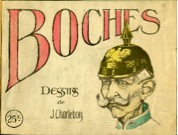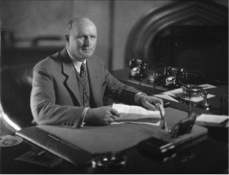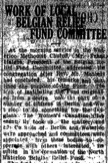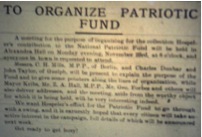German ethnicity was a symbol of the Waterloo Region starting in the mid 19th century; this resulted in constant questions being posed about the region’s loyalty following the outbreak of war. Grey County, located north of Waterloo County, also had serious concerns regarding German loyalty.
With the outbreak of the war Lutherans in Canada were seen in a new light. In Grey County Lutheran ministers and German-Canadians were accused of being disloyal to the British Empire. An article in the Berlin Daily Telegraph sought to dismantle this theory and even went as far as recommending that Ottawa send a detective to investigate, confident that this notion would be debunked once they uncovered the good intentions of the local Germans.
This wartime Canadian comic depicts stereotypical German attire.
(Courtesy of the Canadian War Museum; “German Lutherans Loyalty to the Empire,” Berlin Daily Telegraph, 12 November 1914)







